
The African college of excellence in the social and human sciences
On 21 February 2024, the Unisa Language Unit, under the College of Human Sciences (CHS), and Unisa Library and Information Services, in collaboration with the Puku Children’s Literature Foundation and the Indigenous Languages Initiative for Advancement (ILIFA), celebrated International Mother Language Day under the theme Multilingual education – a pillar of intergenerational learning, at Unisa’s main campus in Tshwane.
International Mother Language Day, first proclaimed by the United Nations Educational, Scientific and Cultural Organization (UNESCO), and later adopted by the UN General Assembly, underscores the role of languages in promoting inclusion and achieving Sustainable Development Goals. UNESCO states that multilingual education policies are crucial for inclusive education and the preservation of indigenous languages. By starting education in the learner's mother tongue and gradually introducing other languages, barriers between home and school are bridged, facilitating effective learning.
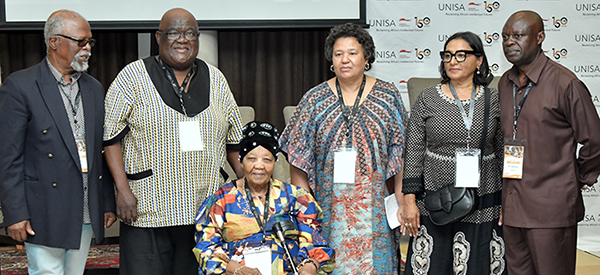
From left, standing: John Kani, Mabutho "Kid" Sithole, Elinor Sisulu, Fazila Montsi and Carlton Mukwevho
Front row, seated: Ouma Katrina Esau
In her welcome address, Prof Zodwa Motsa-Madikane, Unisa Vice-Principal: Teaching, Learning Community Engagement and Student Support, said that this day is to promote awareness of linguistic and cultural diversity, and to foster the importance of multilingualism. She said that in alignment with this year’s theme, the celebration focuses on multilingual education as pillar of learning and inter-generational learning. She continued: "We aim to celebrate and uphold the rich tapestry of languages which contribute to our national heritage." Motsa-Madikane explained that language is not only a tool for education; it is a vessel which carries the essence of culture, history, identity and knowledge.
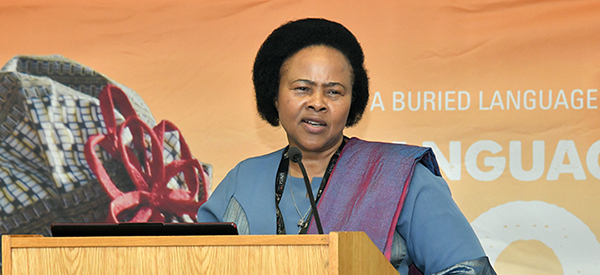
Prof Zodwa Motsa-Madikane, Vice-Principal: Teaching, Learning, Community Engagement and Student Support
"In embracing multilingual education," said Motsa-Madikane, "the university recognises the diverse linguistic backgrounds of our people, and acknowledges the importance of preserving and promoting all of them for future generations. As we start on this journey, we must appreciate the invaluable role of educators in nurturing multilingualism. They are the guardians of linguistic diversity, who shape the minds of the youth and instilling in them a profound appreciation for different languages and cultures."
She said that this year has presented a profound precipice alongside celebrating this annual event in the presence of language activist, Ouma Katrina Esau, whom she described as a living testament to the richness and resilience of the N|uu language. She continued: "Esau, who turned 91 on 4 February, is the last remaining fluent speaker of the N|uu language – a language tethering on the brink of extinction."
In conclusion, Motsa-Madikane made a clarion call to the audience to embrace and take pride in their linguistic heritage.
Prof Siyasanga Tyali, Acting Director: School of Arts, stated that the school teaches 11 of the 12 South African languages. "We are the only school that does this in South Africa, and we are currently working on the 12th one - sign language," he asserted. He said that the school plays a significant role in language initiatives within the university, and the country, in collaboration with Puku and ILIFA through their memorandum of understanding.
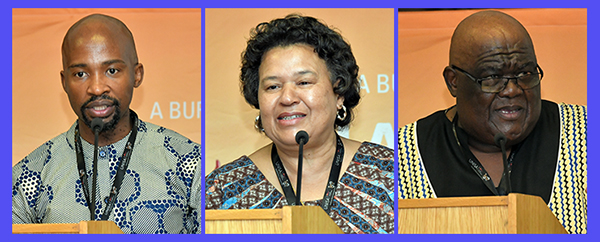
From left: Prof Siyasanga Tyali, Elinor Sisulu and Mabutho "Kid" Sithole
Tyali, together with Puku’s Executive Director, award-winning writer and human rights activist Elinor Sisulu, and chairperson of ILIFA, actor Mabutho "Kid" Sithole, highlighted the significance of their tripartite collaboration, which aims to promote multilingualism and mother-tongue-based education and research, in addition to preserving and elevating the status of previously marginalised languages in classrooms, higher education institutions and society at large.
Carlton Mukwevho, Secretary-General: South African Commission for UNESCO, expressed delight at the tripartite collaboration, stating that their mission is to give worldwide support and visibility to it. He continued: "This is a UNESCO-declared international day. You have a right to celebrate it as one of the 194 member states of UNESCO."
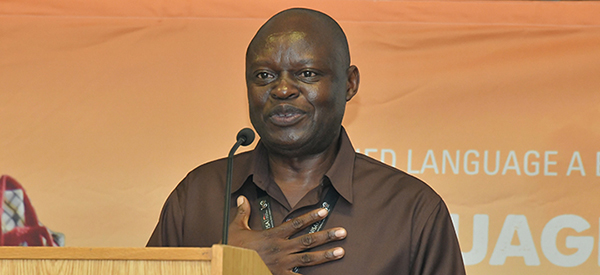
Carlton Mukwevho
Mukwevho highlighted UNESCO's commitment to diversity as a cornerstone of sustainable societies. He stressed that this multi-faceted approach, encompassing cultural and linguistic differences, ultimately fosters tolerance and respect for one another.
Prof Meahabo Magano, Executive Director: Department of Tuition Support and Facilitation of Learning, stated that language has a dual character as both a communication tool and a carrier of culture.
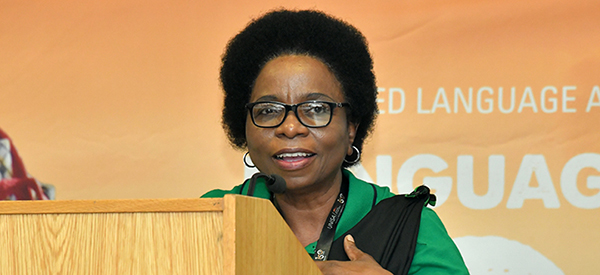
Prof Meahabo Magano
She continued: "The destruction of our culture is a result of negating our own languages. If we did not have any knowledge of diverse languages, our culture and education would die. Language has a connection with our roots. People who do not have an identity started by disowning their language."
Magano stated that teaching in local languages ensures linguistic accessibility, through allowing students to comprehend and engage with academic content more effectively. She continued: "Language also reduces barriers to learning for students struggling with languages imposed by colonial legacies."
In conclusion, Magano stressed that language is a useful tool for cognitive development and academic success.
The International Mother Language Day celebration, graced by the presence of international actor, author, director and playwright, John Kani, and the last remaining speaker of the N|uu language, Esau, alongside writers, film producers and language activists, resonated with a powerful message: multilingual education is not just a pillar of learning, it is a bridge between generations and cultures. The gathering served as a poignant reminder of the vital role society plays in preserving and celebrating linguistic diversity.
*B y Godfrey Madibane, Acting Journalist, Department of Institutional Advancement
** Photography by Shooheima Champion, Multimedia Centre
Remembrance Manganyi, Kgothatso Mojela, Kagiso Moroatsehla, Nomusa Ngema and Seyabonga Thipe, journalism interns at the Department of Institutional Advancement, spoke to a number of Unisans attending the event. Here is what they shared:
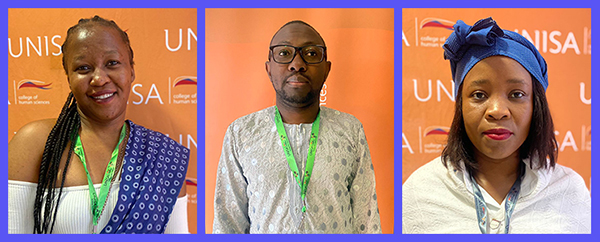
From left: Ipeleng Kopela, Temitope Kerere and Pemla Ditsele
Ipeleng Kopela, Student Assistant, Department of African Languages
This day reminds us, as Africans, of where we come from, where we are going, and in addition, how to embrace who we are, so that our culture may stand out as a significant contributor in our remarkable diversity in the country. The university is already making significant strides in upholding our mother tongue languages through scholarly work and community engagements projects.
Temitope Kerere, student, University of Pretoria.
It is important to celebrate and enrich our native languages as part of our cultural heritage. Failing to do so will result in the future generations not embracing it. I embrace my mother tongue, Yoruba, wherever I go, especially when I am outside my country, Nigeria.
Using our mother tongue in higher education, commerce, and daily communication is crucial. Although universities have policies for promoting the development of mother languages, we should not rely solely on their implementation. Instead, we should ensure that each student is taught in a language that they can understand.
Pemla Ditsele, Junior Lecturer, Department of African Languages
Language is culture which sustains social cohesion; therefore, individuals find identity in a culture that is embedded and reflected in language. Our institution must maintain a language policy that includes more of our indigenous languages, especially those facing extinction.
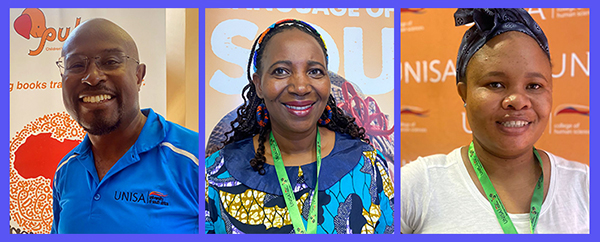
From left: Melvin Raabwe, Mokgadi Senyolo and Tsholofelo Matshwisa
Melvin Raabwe, Puku Children's Literature Foundation
It is important to preserve languages because they are an oral history of who we are as people. One of the things that research has produced shows that children who first learn in their mother tongue can then learn other subjects much easier. Trying to teach a child mathematics or sciences in their own mother tongue will make the concepts much easier.
Currently, Puku is engaged in digitising indigenous languages so they can be accessible on digital platforms, through working with publishers, authors, and illustrators. We are working with Unisa together with the National Library and other overseas libraries to create more archives of our books.
Mokgadi Senyolo, Acting Manager: Branch Library (Muckleneuk campus), Unisa Library and Information Services
It is important to promote the diverse languages we have in South Africa. We are losing our identity of who we are as we are not embracing more of our mother tongues. This is evidenced in cases where you converse with a fellow African, but prefer switching to another language not belonging to our mother languages. This contributes to a loss of identity. We should promote Africanism as Africans. We need to embrace each other’s identity, culture, and heritage.
Unisa is the largest university in the land and has various resources that can contribute to embracing our mother tongues. This year, the Sesotho language is celebrating 200 years of written language. The university’s library has put up exhibition stands with books in Sesotho and other materials to honour this significant milestone.
Tsholofelo Matshwisa, Junior lecturer, Department of African Languages
It is important to celebrate this day because it promotes our African languages and unites us Africans. Our university is already promoting mother languages as through the indigenous South African languages that are taught in the Department of African Languages.
Publish date: 2024-02-23 00:00:00.0
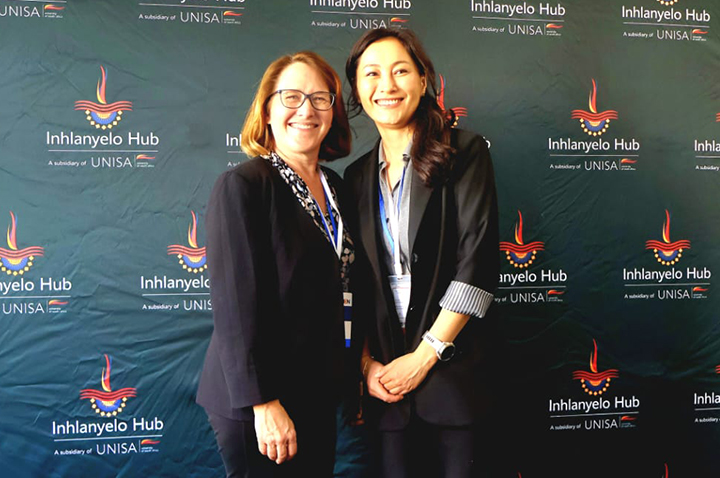 Unisa roundtable focuses on empowering SA women to lead in innovation
Unisa roundtable focuses on empowering SA women to lead in innovation
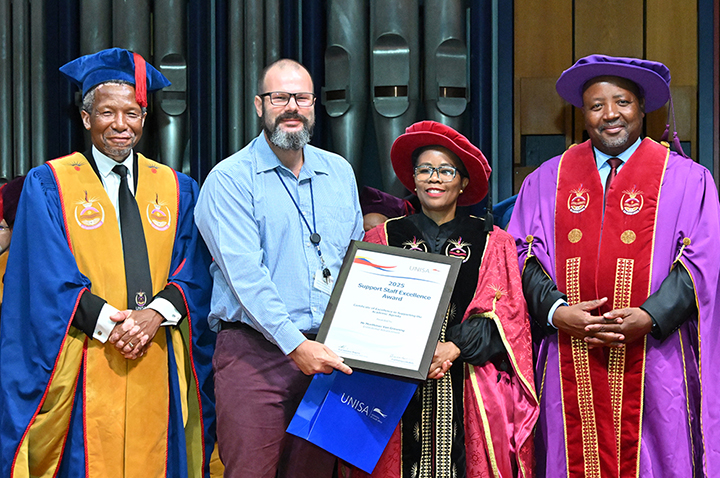 Unisan recognised for web excellence
Unisan recognised for web excellence
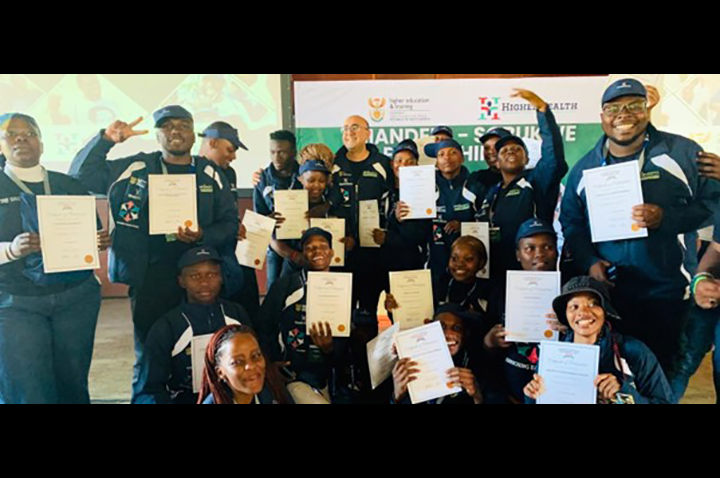 Office of the Dean of Students participates in leadership camp
Office of the Dean of Students participates in leadership camp
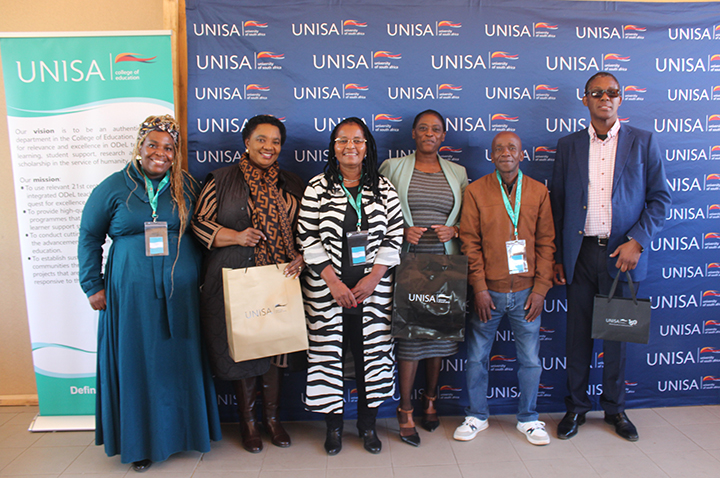 Unisa project fosters digital and pedagogical innovation in Limpopo schools
Unisa project fosters digital and pedagogical innovation in Limpopo schools
 Unisa student wins prestigious national leadership award
Unisa student wins prestigious national leadership award